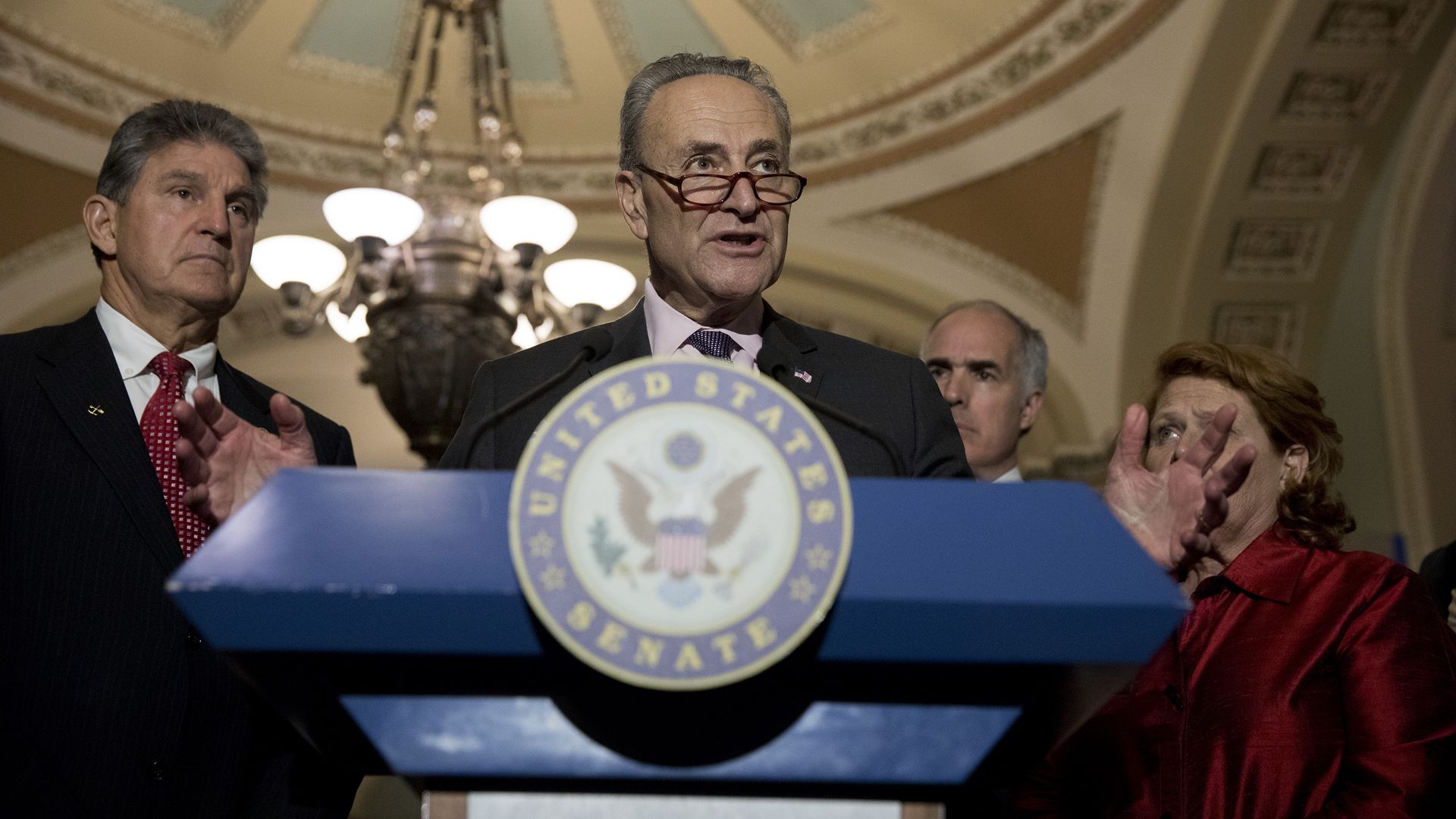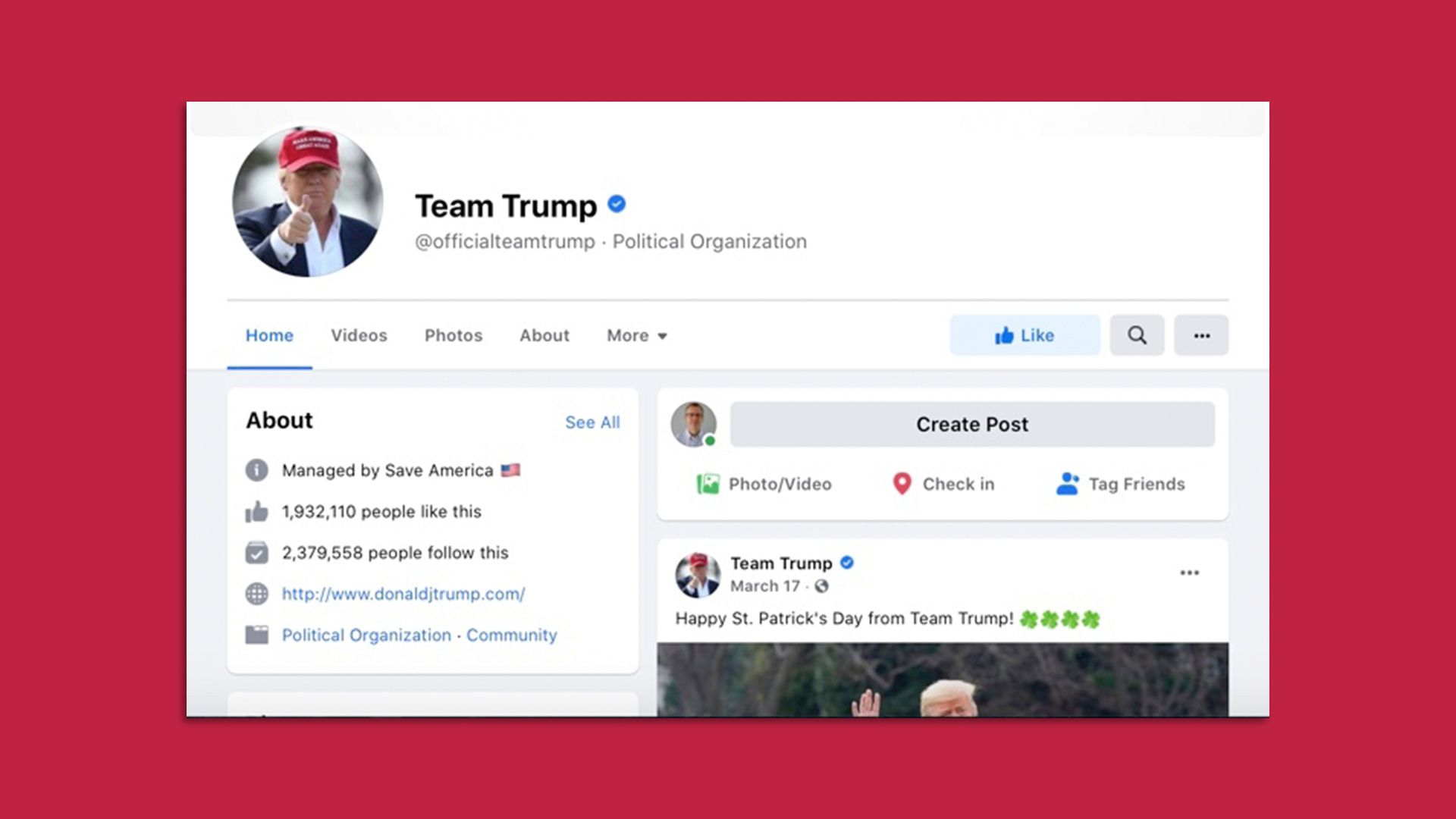| | | | | | | Presented By Facebook | | | | Axios Sneak Peek | | By Alayna Treene and Hans Nichols ·Jun 21, 2021 | | Welcome back to Sneak. An infrastructure deal started to solidify. Smart Brevity™ count: 1,373 words ... 5 minutes. Edited by Glen Johnson. | | | | | | 1 big thing: The Senate's "too-big-to-fail" plan |  | | | Illustration: Shoshana Gordon/Axios | | | | Senate negotiators for the bipartisan infrastructure bill are trying to create momentum for a "too-big-to-fail" package by adding an equal number of Democratic and Republican co-sponsors, Axios' Alayna Treene and Hans Nichols have learned. Why it matters: White House officials are encouraged about how the talks are proceeding and are discussing when President Biden might declare his support for the roughly $1.2 trillion package, if the remaining issues are resolved. - Biden hosted Sens. Joe Manchin (D-W.Va.) and Kyrsten Sinema (D-Ariz.), separately, at the White House today.
- The president told them "he was encouraged by what has taken shape but that he still has questions about the policy, as well as the means for financing the bipartisan group's proposal," according to a White House official.
- "The president also made clear that he is, at the same time, focused on budget resolution discussions in the Senate," according to the official.
- A group of legislative directors for the G20 bipartisan group of senators plan to further discuss the details of the proposal among themselves tomorrow, sources familiar with the meeting tell Axios.
The big picture: Members of the G20 emerged from the Senate hideaway office of Sen. Rob Portman (R-Ohio) tonight to express confidence they could have a deal. - "We are making significant progress, but it's not over until it's over," said Sen. Susan Collins (R-Maine).
The other side: Progressives remain leery and are aiming for much more spending, potentially in multiple packages. - "Make no mistake: I'm not voting for some bipartisan deal until I see every other part of the infrastructure package, and know that, in total, we have what we need," Sen. Elizabeth Warren (D-Mass.) told Axios.
- "We're not going to have an infrastructure package that, when the train leaves the station, child care is left on the platform, along with clean energy" and other priorities.
Driving the news: Several additional senators — from both parties — are expected to come out in favor of the bipartisan package this week, the aides say. - The key is to employ a "one-and-one" or "Noah's Ark" strategy, in which each supporter would bring a colleague from the other party to build Republican and Democratic support for the package equally.
- The goal is to shift the focus to the number of Republicans getting on board, as opposed to questions about how many Democrats — particularly progressives — will be lost through the bipartisan negotiations.
- "It went from 10 to 21 (supporters) pretty fast, and I think there are other people that are interested," Sen. Angus King (I-Maine) tells Axios. "I think that's an important part of the dynamics of the group, that it not be viewed as slanted one side or another."
Keep reading. 👓 Worthy of your time: "Moderates urge Biden to continue bipartisan infrastructure route." |     | | | | | | 2. Voting rights — and filibuster — in spotlight tomorrow |  | | | Sen. Joe Manchin (D-W.Va.) and Senate Majority Leader Chuck Schumer (D-N.Y.). Photo: Aaron P. Bernstein/Getty Images | | | | The Democrats' massive voting rights package — and in turn, the debate over eliminating the filibuster — will be brought to the forefront tomorrow through a procedural vote. Why it matters: The vote on the For the People Act will be a key indicator of whether Democrats will move forward with their most controversial — but highest priority — legislation, or are forced to retreat, Alayna also writes. - If all 50 Democrats get on board, then the conversation about how to proceed — including calls for abandoning, or at a minimum revising, the filibuster — will ramp up.
- Preserving voting rights is expected to be a flashpoint for the midterm elections — for both parties.
- And many Democrats fear that if they don't eliminate the filibuster to pass their agenda while in control of both chambers of Congress and the White House, their supporters will retaliate at the polls, or by not voting at all.
Driving the news: The view among Democratic leaders and the White House is they can't set up bypassing the filibuster until they get everyone together on a voting rights package. - All eyes are on Sen. Joe Manchin (R-W.Va.), who, as of now, has not been clear about whether he'll vote to advance the For the People Act for further debate.
- Regardless of how he votes, the motion will fail because it has no shot of getting the necessary 10 Republican votes needed to achieve the 60 votes needed to pass major legislation.
But, but, but: Two Democratic senators — Manchin and Kyrsten Sinema of Arizona — have said since January they're not going to get rid of the filibuster. - And even if Manchin votes to clear this procedural hurdle, it doesn't mean he'll vote in favor of the package, or change the filibuster.
- "There's still a million outs for Joe Manchin, regardless of how he votes" tomorrow, a senior Senate Democratic aide told Axios.
- But a successful procedural vote would kick off the next series of steps in both the voting rights fight and the question of how to deal with the filibuster.
Keep reading. |     | | | | | | 3. By the numbers: Lawmakers sponsoring most voting bills |  Data: Quorum; Chart: Danielle Alberti/Axios Senators and House members have introduced 59 bills with multiple sponsors this Congress mentioning issues like ballot access, election integrity, absentee voting, voter registration, voter identification and mail-in ballots, according to data from Quorum reviewed by Axios' Stef Kight. Why it matters: Efforts to change voting laws and end the filibuster are coming to a head this week with the initial vote on Democrats' For the People Act scheduled for tomorrow. - One bill not introduced so far during the 117th Congress: the John Lewis Voting Rights Advancement Act, which Sen. Joe Manchin (D-W.Va.) supports.
- It would restore some voting rights protections of the Voting Rights Act struck down by the Supreme Court in 2013.
The big picture: While Democrats are failing to get the support needed to pass major voting legislation in Congress, Republican state lawmakers have introduced hundreds of voting bills this legislative year. - They include measures that could make it harder for some people to vote.
- As of mid-May, 14 states had enacted 22 of these laws, according to the Brennan Center.
|     | | | | | | A message from Facebook | | The internet has changed a lot since 1996 - internet regulations should too | | |  | | | | It's been 25 years since comprehensive internet regulations passed. See why we support updated regulations on key issues, including: - Protecting people's privacy.
- Enabling safe and easy data portability between platforms.
- Preventing election interference.
- Reforming Section 230.
| | | | | | 4. Team Trump's Facebook ads circumvent ban |  | | | Via Facebook | | | | Donald Trump may be banned from Facebook, but his political operation continues using it to raise money, records reviewed by Axios' Lachlan Markay show. Why it matters: A new round of ads purchased by a political group associated with him shows how the former president can continue tapping the world's largest social network even as Trump himself is barred from the platform. What's happening: The sum Team Trump is spending on its new Facebook ad campaign is minor: just over $3,500 since Friday, according to the site's political ad archive. - The ads notably avoid any messaging in Trump's voice, instead asking for donations "to stand with President Trump" and "stop Kamala (Harris) and Joe Biden."
- The ads ran on the page "Team Trump," and directed supporters to an online donation page benefitting a Trump-controlled fundraising group, Save America JFC.
The big picture: Trump himself is banned from Facebook until early 2023 following his routine promotion of false conspiracy theories alleging the 2020 election was stolen. - "President Trump is suspended from Facebook, so he can't post at all. Groups affiliated with the former president are not barred from posting on Facebook, so long as they are not posting in his voice," Facebook spokesperson Andy Stone told Axios.
- He noted that some Team Trump ads were rejected for linking to the former president's website, DonaldJTrump.com.
What they're saying: "I think it's a clear gap/loophole in the policy," said Katie Harbath, a fellow at the Bipartisan Policy Center and Facebook's former public policy director. - "I think it shows we need more detail from FB and Twitter about what it means when you de-platform a politician and which of their connected entities also get banned because of their connection," Harbath wrote to Axios.
Between the lines: Team Trump's Facebook ad buy comes as the former president kickstarts other parts of his formidable political operation. - Trump is once again hitting up supporters via email asking for donations.
- He's also back on the rally circuit, his signature form of political campaigning.
|     | | | | | | 5. Pic du jour |  | | | Photo: Kevin Dietsch/Getty Images | | | | Treasury Secretary Janet Yellen leaves the White House after President Biden met with her, Federal Reserve Chair Jerome Powell and other financial policy regulators. |     | | | | | | A message from Facebook | | Why Facebook supports updated internet regulations | | |  | | | | 2021 is the 25th anniversary of the Telecommunications Act of 1996, the last major update to internet regulation. It's time for an update to set clear rules for addressing today's toughest challenges. See how we're taking action on key issues and why we support updated internet regulations. | | | | 📬 Thanks for reading. A reminder you can subscribe to this or any of Axios' other free newsletters by clicking here. |  | | The tool and templates you need for more engaging team updates. | | | | | | Axios thanks our partners for supporting our newsletters. If you're interested in advertising, learn more here.
Sponsorship has no influence on editorial content. Axios, 3100 Clarendon Blvd, Suite 1300, Arlington VA 22201 | | | You received this email because you signed up for newsletters from Axios.
Change your preferences or unsubscribe here. | | | Was this email forwarded to you?
Sign up now to get Axios in your inbox. | | | | Follow Axios on social media:    | | | | | |









No comments:
Post a Comment